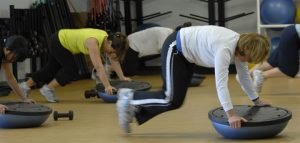How coordinated are you?
Improving coordination is a subject that gets less coverage in fitness circles than others. There are acres of pages on losing weight or strength training, but coordination is less talked about.
But when you think about it, good coordination is at the heart of so much of what we do. Whether it is driving, rushing for the train, or navigating your way around a busy street.
Good coordination can enhance your ability in sport. It can help prevent all kinds of injuries and help you stay more effective as you age.
So whilst the usual metrics of cardiovascular fitness and strength and flexibility all matter, it pays to focus some attention on how you coordinate movement.

Improving coordination
Improving Coordination – Is it actually possible?
Many people think that levels of coordination are pre-determined. Either they have rhythm or they are clumsy. This is often reinforced by the feedback we get from peers or parents in our early years. But the truth is, coordination is a learnable skill. And it is one that is worth pursuing.
So let us address what coordination actually is. It is the ability to use different parts of the body together smoothly and efficiently. And improving coordination can benefit you in ways that go beyond the purely physical.
Coordination exercises utilise an area of the brain known as the cerebellum. It is linked with the ability to think and also how fast you can process information. It seems that exercises that require coordination can help to make you smarter and give you better self-control.
Different ways in which to improve coordination
There are some obvious choices for improving coordination. Especially with the popularity of ‘Strictly’, dancing would be high up on that list.
Dancing of all varieties will improve coordination. It has additional benefits for your social and psychological well-being too.
Other clear-cut favourites would include swimming and of course racquet sports.
But there are three options that may be less obvious, Tai Chi, Pilates and yoga.
Each of these last three get to the heart of what is involved in learning to coordinate movement.
The process of learning better coordination
Regardless of the type of activity you choose, there are some key pointers that will help you develop your coordination skills.
The foundation for good coordination is good balance. Dance instructors, tennis coaches and karate instructors alike will all teach the fundamentals of stance. If you don’t start off in a balanced position you will struggle to coordinate movement.
Another key ingredient is self-awareness. When you are learning a new physical skill the instructor will encourage you to rehearse the activity at a much slower rate. It allows you to be more cognizant of what your body is actually doing.
Next, you need to think about sequencing. You need to understand how one part of the movement chain will affect subsequent movement.
And finally, visualisation is a critical part of the mix. You have to be able to picture yourself performing a task before you truly have the ability to perform it.
Improving coordination can broaden other transferable skills. Think about an activity that can be both fun and also bolster your movement skills such as playing with your kids, if you have any, in one of those best outdoor playhouses. You won’t regret it.
We hope this information is useful for you. If you have any questions about our treatments, please contact us. You can find us in Mill Hill Broadway and Islington. If you like this blog, please share! We are always happy to help.




I read your whole content it’s really interesting and attracting for new reader.
Thanks for sharing the information with us.
Hi Onbacarat,
Thank you for your comment, we are glad this content has been of value to you!
Kind Regards,
Perea Clinic team.